by Center for Mentoring Excellence | Mar 19, 2018 | Advice for Leaders, Alignment, Assumption Hunting, Checking Out Assumptions, Facilitating Learning, Goal Setting Conversation, Group Mentoring, Growth and Development, Making Mentoring Work For You, Mentoring Communication, Mentoring Questions, Mentoring Relationships, Mentoring Training, Supporting Mentors and Mentees
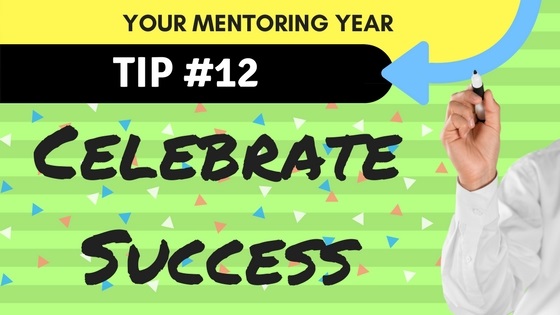
Celebrate Success!
How long has it been since you’ve taken a look at the progress you’ve made? As a mentor? As a mentee? In your business? In your personal growth?
We encourage you to take time each quarter with your mentoring partner to celebrate your achievements. What are the demonstrable improvements in outlook, behavior, performance and work satisfaction since your mentoring relationship began? Get specific and outcome-focused. We can’t fully appreciate where we are until we’ve celebrated how far we have come.
by Center for Mentoring Excellence | Mar 5, 2018 | Advice for Leaders, Alignment, Assumption Hunting, Checking Out Assumptions, Facilitating Learning, Goal Setting Conversation, Group Mentoring, Growth and Development, Making Mentoring Work For You, Mentoring Communication, Mentoring Questions, Mentoring Relationships, Mentoring Training, Supporting Mentors and Mentees
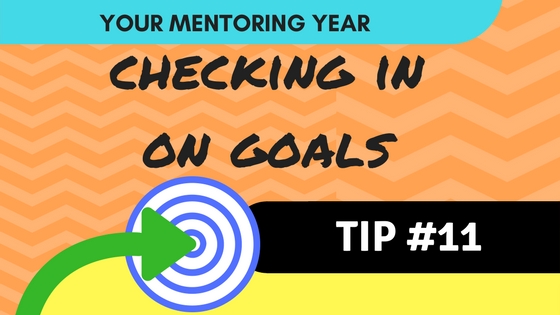
Checking in on Goals
How will you know whether or not you’re achieving your goals?
When you get results? Yes. Sometimes that’s the case.
More often the knowing and the awareness of where you are at with your goals lies in the simple, and powerful, action of checking in. You can do this on your own, with a friend, cohort or mastermind and/or with a mentor.
The real work of refreshing your memory and looking at your goals, framing them in your vision, is actually so simple that many overlook it. You won’t when you actively follow this tip.
by Center for Mentoring Excellence | Jan 25, 2018 | Advice for Leaders, Assumption Hunting, Checking Out Assumptions, Facilitating Learning, Goal Setting Conversation, Group Mentoring, Growth and Development, Making Mentoring Work For You, Mentoring Communication, Mentoring Questions, Mentoring Relationships, Mentoring Training, Supporting Mentors and Mentees
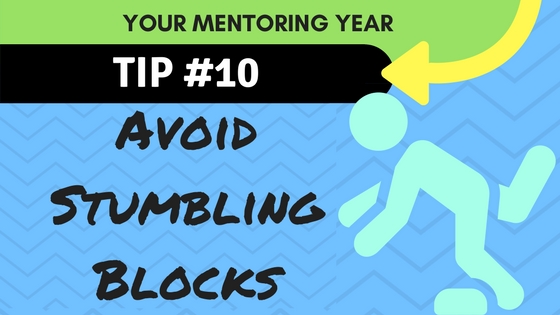
One of the biggest stumbling blocks for mentoring pairs is staying on track over the course of the year.
To make sure you avoid this potential trap, make sure you determine how to manage your mentoring time:
How often and how long will you meet?
How will you handle and reschedule cancelled meetings? Consider using an agenda, preparation, and journal as vehicles for maximizing learning. Your schedule holds and organizes your most valuable asset – your time.
For new mentor/mentee relationships, the development of an agreed-upon framework will not only set expectations, but also support focused meeting times so you both get the most out of your time together.
For more experienced pairs, referring back to the framework (or creating a new one) is a great way to a mentoring relationship back on track.
Ready for more? Review the Mentor’s Guide: Facilitating Effective Learning Relationships for more support, insight and tools.
by Center for Mentoring Excellence | Dec 19, 2017 | Growth and Development, Mentoring Relationships, Mentoring Training, News and Updates, Supporting Mentors and Mentees
Leadership Development Services’ Vice President assumes key leadership role starting January 2018.
Phoenix, AZ; Seattle, WA — December 19, 2017
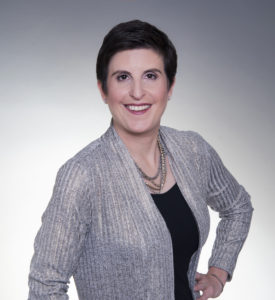
Lisa Z. Fain, Leadership Development Services Vice President and new CEO of the Center for Mentoring Excellence
The Center for Mentoring Excellence, a division of Leadership Development Services LLC, is proud to announce that Lisa Z. Fain will become its Chief Executive Officer effective January 1, 2018. She will lead its practice of creating learning, growth, community, and inclusion for organizations and leaders seeking to achieve business results through mentoring excellence.
According to Dr. Lois Zachary, the current Chief Executive Officer:
“We are thrilled to have Lisa leading the Center for Mentoring Excellence. She is highly regarded for her combination of knowledge, expertise, humor, and no-nonsense practical approach to enhancing mentoring performance. Her passion for diversity and inclusion work has enabled her to assist mentors and mentees to understand, bridge, and leverage their differences to achieve better business results.”
Ms. Fain has conducted mentoring training programs in corporate, government, and educational institutions. A skilled facilitator and experienced coach, she offers clients solutions that come from her diverse experience and utilize her ability to listen and understand clients’ needs. She gives practical, actionable guidance to help organizations maximize the return on their investments in mentoring. Speaking about the transition, Lisa Fain said:
“I am very excited and honored to lead the Center for Mentoring Excellence. I look forward to continuing Dr. Zachary’s work to bring the very best in mentoring practices to organizations committed to their employees’ development and growth. Dr. Zachary will continue her association with Leadership Development Services and the Center, and we plan to offer new services from time to time, such as Mentoring Excellence Masterminds, which provides monthly online support for mentors, mentees, and program administrators to achieve sustained accountability and excellence.”

Lisa Z. Fain and Dr. Lois J. Zachary
Since October 2015, Fain has been Leadership Development Services’ Vice President and lead in Diversity Strategy and Cultural Competency, as well as CEO and Founder of Vista Coaching. Prior to those roles, Fain served as Senior Director of Diversity and Inclusion at Outerwall, Inc. (the parent company to automated retail giants Redbox and Coinstar). Lisa spearheaded the development and implementation of its diversity initiative, including launching the company’s first mentoring program for its Women’s Business Resource Group. Prior to that position, she worked as Outerwall’s in-house counsel, where she coached leaders and partnered with Human Resources to establish fair and effective policies and practices to sustain the organization as it grew in size, revenue, and renown.
Previously, Lisa practiced law with the Chicago office of a major multinational law firm and counseled employers on creating inclusive policies and practices. In addition, she served as a Master Trainer, training thousands of employees at a variety of companies on how to create a better workplace. Certified as a mediator through Chicago’s Center for Conflict Resolution, Lisa applied her counseling skills to help clients understand and prevent conflict.
Lisa holds a B.S. in Social Policy from Northwestern University and a JD degree from its School of Law. She is also a certified Life Coach, with certification from the International Coach Academy.
About the Center for Mentoring Excellence®
Center for Mentoring Excellence is a rapidly growing consulting, training, and coaching firm that offers training, consultation, and coaching to promote, elevate, and enhance the practice of mentoring excellence. Based on the work of its founder, author Dr. Lois Zachary, and its talented mentoring experts, the Center is able to provide customized solutions and services to its clients.
Its latest program, Mentoring Excellence Masterminds™, offers ongoing and just-in-time support to maximize the effectiveness and ROI of mentoring.
For more information about the Center for Mentoring Excellence and its unique mentoring services, visit www.centerformentoring.com.

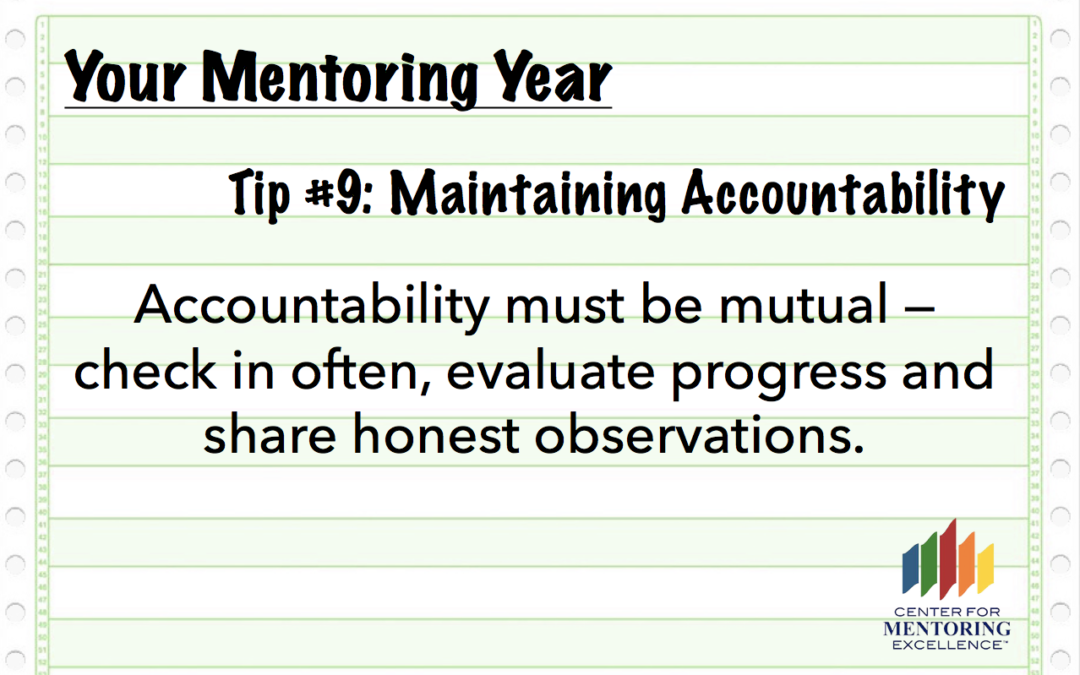
by Center for Mentoring Excellence | Dec 5, 2017 | Advice for Leaders, Facilitating Learning, Goal Setting Conversation, Growth and Development, Making Mentoring Work For You, Mentoring Communication, Mentoring Relationships, Mentoring Training, Supporting Mentors and Mentees
Maintaining accountability in a mentoring relationship is critical for success. But it’s not one-sided. Accountability must be mutual. “Wait, what?” you might be thinking. “Accountability is hard enough, but mutual accountability?”
Yes! Making sure both mentors and mentees are accountable keeps mentoring relationships moving and on track thanks to regular care and attention. Regular monitoring of your relationship guarantees that even when the relationship seems to be going well, you can still promote mutual accountability and, therefore, a healthy relationship.
How do you get started? Use the following conversation tips to provide a framework that drives mutual accountability — and helps maintain it.
-
Check in at the beginning of your meeting. Regularly ask, “How is it going?” Probe your mentee’s response, and take it to a deeper level.
-
Share your observations about how things are going and what concerns you have about the learning process. For example, “I’ve noticed that our discussions are very general and theoretical. Are you finding them helpful?”
-
Take a step back before you go forward. For example, “Let’s take a look at how we’re doing. What’s particularly helpful to you in your learning? What has been least helpful? What do you think is going well? What do we need to improve? What kind of additional assistance do you need?”
-
Use your mentee’s goals as benchmarks for measuring the progress and achievement of learning goals. Refer to them frequently. Evaluating progress regularly maintains momentum, keeps learning goals at the forefront of the relationship and holds partners mutually accountable for achieving them.

by Center for Mentoring Excellence | Nov 8, 2017 | Facilitating Learning, Growth and Development, Supporting Mentors and Mentees
As one of the Plenary Speakers at University of New Mexico’s 2017 Mentoring Institute Conference, Dr. Lois Zachary tackled an important mentoring practice — looking back so that we can move forward. In her address, Dr. Zachary discusses the past and future of mentoring using Dr. James Ryan’s “Five Questions” as a framework.
In this video, Dr. Zachary explores the first two questions, using them as a lens for viewing the past and the future.










